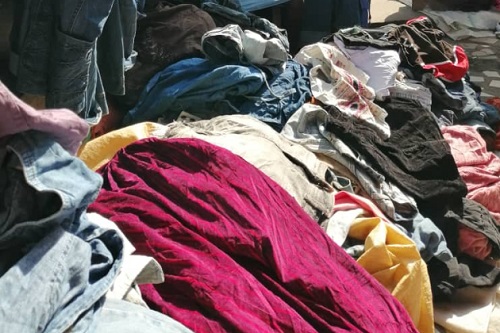The Ghana Standards Authority (GSA) is with immediate effect going all out to enforce the ban on the sale of second-hand clothing, including brassieres and panties, the Director-General of the authority, Professor Alex Dodoo, has said.
In 1994, Ghana passed the Legislative Instrument (LI) 1586, which outlawed the importation, clearance and sale of used undergarments because they were found to be unhygienic and presented a health hazard.
However, the implementation of the law was never carried out and the second-hand clothing continued to flood the markets.
But with the advent of the COVID-19 pandemic, the regulator - GSA - believes the time to act is now.
The regulation
The LI states: “No person shall import for commercial purpose or in commercial quantities any of the following goods which are second-hand or which have been used – handkerchiefs; men, women and children’s underpants; mattresses and sanitary ware.
“A person who imports any goods contrary to the regulation above commits an offence and is liable on conviction to a fine not exceeding GH¢500,000 or imprisonment for a term not exceeding one year or to both, and the goods in respect of which the offence was committed shall be liable to be seized and forfeited to the State.”
In an interview with the Daily Graphic in Accra last Tuesday, March 24, Prof. Dodoo said the enforcement, which would start in due course, would be done at the various entry points of the country.
Enforcement
That would help ensure that used clothing classified as banned were not allowed into the country, especially at this moment when the world was battling the spread of the COVID-19, he said.
He stated that the authority would also begin market surveillance across the country to rid the market of banned second-hand items such as brassieres, panties and handkerchiefs.
“We are triggering all the measures at the entry points to ensure that some of these items do not get to the open market because anything unhygienic is a threat to public health at this moment,” Prof. Dodoo said.
He explained that not all used clothing had been banned under the Legislative Instruments (L.I. 1586) of 1994 and (L.I. 1693) of 2001 which placed a ban on the importation of some used merchandise.
As a result, he said some clothing were acceptable under the laws of the country to be imported through the recognised organisations that had been certified to indulge in the second-hand clothing business.
Those organisations, Prof. Dodoo said, were expected to disinfect the goods before bagging and exporting them to ensure that they did not pose a health risk to persons who patronised them.
“As for the clothes, they are expected to be disinfected by the organisations that ship them into the country, so we will ensure that the right things are done; but we will get onto the market to ensure that banned items are not sold on the open market,” he said.
Health risk
Prof. Dodoo said the health risks posed to persons who patronised such items, especially during this period of crisis, were enormous.
He said the public could help curb the spread of the virus through cleanliness.

